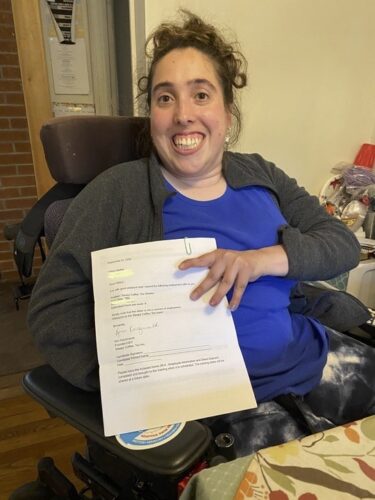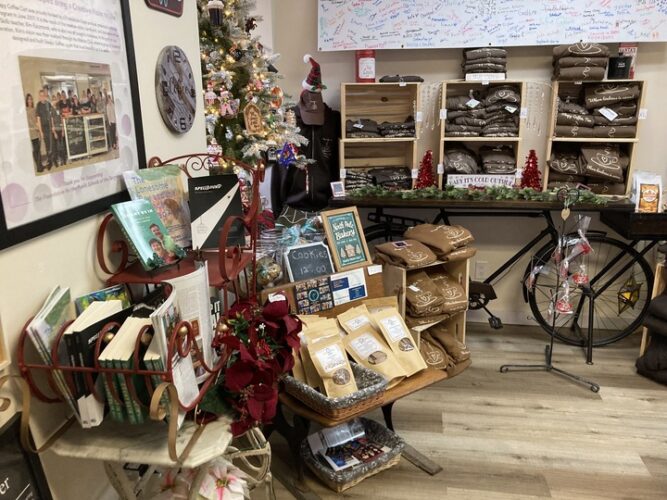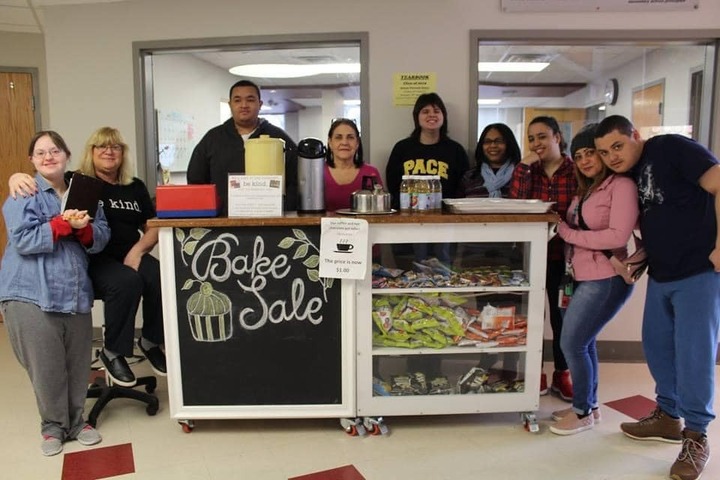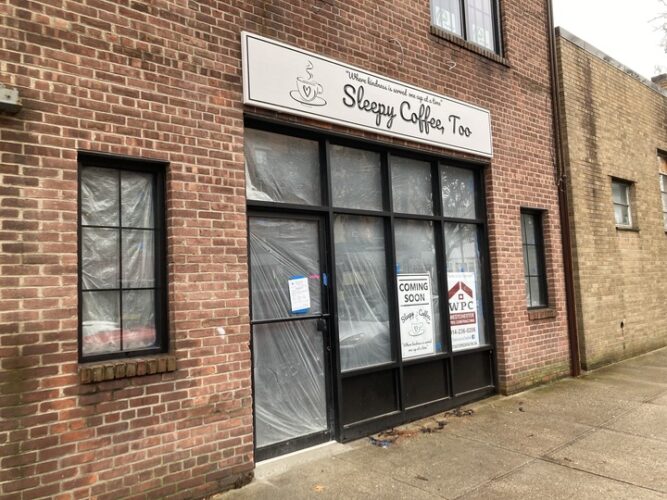Retired Special Ed Teacher Stakes $125,000 to Open Coffee Shop That Gives Former Students Jobs
Central perk: Small-town coffee house in New York’s Hudson Valley offers much-needed jobs after high school.
By Jo Napolitano | December 20, 2023Sleepy Hollow, N.Y.
It came last summer in a white envelope she couldn’t wait to open. Hillary Barber, 29, had already interviewed for a position at a soon-to-open coffee house in Sleepy Hollow, 45 minutes north of Manhattan, but didn’t know if she earned a spot.
A witty and tenacious young woman with a megawatt smile, Barber has cerebral palsy, a condition that limits her mobility and makes it difficult for her to speak. Like so many other developmentally disabled adults across the country — and, particularly, in New York state — she had trouble finding work after she graduated from high school in 2013 at age 19.
That letter, she hoped, could change everything.
“It is with great pleasure that I extend the following employment offer to you,” read the invitation from the nonprofit Sleepy Coffee, Too, founded by former special education teacher Kim Kaczmarek.

“I’m so happy,” Barber told an aide that night. “My life is complete.”
It would mark Barber’s first-ever paid work, an enormous victory for a young woman who was too often underestimated: Just 21.3% of people with a disability were employed in 2022, up from 19.1% the year before, according to the U.S. Bureau of Labor Statistics. For those without a disability, the figure was 65.4% in 2022, up from 63.7 percent the prior year.
A smaller offshoot of what will soon be Sleepy Coffee, Too — called The Little Shop of Coffee and Dry Goods — opened in a cozy 700-square-foot storefront in June 2023, employing Barber and 16 other adults with developmental disabilities. Kaczmarek, 64, came out of retirement to open the store, staking $125,000 of her own money on the venture.
Many of her employees are her former students. The staff is devoted — they ask their families to reschedule vacations and other outings around their shifts — and eager to take on the working world’s challenges. That exposure has greatly improved their communication skills.
“I had some kids who were virtually nonverbal who are now some of my best customer service employees,” Kaczmarek said. “They found their voice.”
As the employees are growing, so is the business. Sleepy Coffee, Too is poised to move to an adjacent downtown location in the next few months that will double its size and allow the shop to expand its hours.
On a recent rainy Sunday afternoon, customer traffic was slow but employee Maggie Collier, 21, was ready to help anyone who walked through the door. Sitting behind the counter, she spent the afternoon brewing coffee and refilling the store’s milk, sugar, sweeteners, cups, stirrers and napkins.
The store, neatly stocked with all manner of coffee, is packed with other items, too, including books written by and on behalf of disabled adults and socks sold by the family of a Long Island man with Down syndrome.

A mannequin in the left-hand corner models a brown zippered sweatshirt and baseball cap emblazoned with the store’s logo while a waist-high display case offers cookies and granola Like many of its coffee house competitors, the store’s walls and shelves are adorned with signs bearing cheeky messages like, “Espresso Yourself.”
Collier, who learned of the shop through her father’s friend, the also now-retired schools superintendent in neighboring Tarrytown and Kaczmarek’s former boss, is eager for the new space to open. An avid baker, she’s excited about adding snacks to the menu.
“I’m looking forward to working with more customers in a larger coffee shop,” she said. “And I like working with people my age. I like taking initiative.”
Dreams of a coffee shop during COVID
Kaczmarek has long known her students had a hard time beating employment odds. The pandemic made their plight even more difficult. During that dark time, the former teacher’s heart would break when she saw her former students on the streets of this Hudson River village that’s home to Washington Irving’s legends, the headless horseman and Ichabod Crane.
Their regression was stark, Kaczmarek said. Young people whom she coached for years to meet her gaze and engage in polite conversation were now averting their eyes. The educator didn’t want further isolation to undermine any more of her — or her students’ — good work. But she didn’t immediately know how to help.
The teacher reflected on the successful coffee cart she and her students opened — she used it to help them learn about operating a small business and to fundraise for their field trips — in her district’s administrative office in 2016 and how it grew even more popular at the high school.
Neurotypical students designed and helped build a cart complete with display cases, lights and locking wheels. Students and staff proved devoted patrons: Sleepy Coffee’s brownies would sell out in minutes each morning.

“There was a respect toward my students that had never been there before,” Kaczmarek recalled. “I think it really changed the culture of school.”
She remembered how members of the football team would high-five her kids as they passed each other in the hall. Kaczmarek’s classroom was in the main hallway and her students were highly visible.
“The more they were out doing things that everyone else did, it made not just the students, but the staff realize we are more the same than different,” she said. “They want to have friends, a boyfriend or girlfriend, to be invited to places. It took the stigma away. It became normal. The other students got it very quickly.”
But how could she translate that sense of fairness and inclusion to the outside world? Would the general public have the same goodwill? Sure, she had seen it done before. But it had been decades.
Helping Adam
Kaczmarek was 11 years old when a developmentally disabled boy was born to a family across the street in her hometown of Briarcliff Manor, just north of Sleepy Hollow. This was the 1960s, an era when many such children were immediately sent off to live in institutions, often at the urging of the family doctor.
Not Adam.
His family wanted to keep him close, but they couldn’t care for him alone. So, they invited friends and family to work and play with him each day in shifts.
“His mother had a big schedule in the house and people signed up and were given fast training,” said Kaczmarek, who was among the volunteers.
Back then, she said, the favored technique was “patterning,” a series of exercises meant to help children with neurological impairments. That, and trying to build Adam’s gross motor skills.
“It really had an impact on me, watching my neighborhood come together like that,” Kaczmarek said. “It was an incredible time.”
And it taught her a lesson that would become her mantra.
“There is always a way to solve any problem,” she said. “When people work together, miracles can happen.”
‘It turned out to be good’
Kaczmarek went on to earn a bachelor’s in special education from Syracuse University and a master’s from Fordham. Adam eventually became one of her students.
She hoped — if she could only figure out how — to generate the same support for her former students today, and approached them to gauge their interest in opening a brick-and-mortar coffee shop. They were elated at the thought.
Kaczmarek inherited the $125,000 seed money from her parents and remembered what her father told her just before he died: Don’t wait too long to do whatever it is you want to do with the rest of your life.
She’s then raised an additional $200,000 through grants, donations and fundraising and she’s always looking for more to add staff and expand their hours.
Adam’s sister, Kaczmarek’s friend since childhood, grew up to run a successful coffee shop of her own and has become a valuable mentor. And another friend in the community alerted Kaczmarek to the bigger spot her shop will soon occupy: It was abandoned and available for rent at a reasonable price.

Kaczmarek’s students have been working on the project for well more than a year, meeting at first through Zoom and then in person as they opened the first storefront.
“They are stimulated every day. They have an obligation. They are part of a business,” she said.
Jake Loerker, 24, worked at a movie theater taking tickets, handing out snacks and vacuuming the floor before he landed at the Beekman Avenue shop, where he mostly handles money.
“You know what?” he said of Sleepy Coffee, Too. “It turned out to be good. The customers are friendly.”
Elvira Juarez, who worked as Kaczmarek’s teaching assistant, serves on the nonprofit’s board of directors and whose child is among the shop’s employees, has watched her 31-year-old daughter blossom as her involvement with the coffee shop grew. So excited about work, she prepares for her shift days in advance.
“On Thursday and Friday, she’s always getting her uniform ready even though it’s not until two days after,” Juarez said. “She’s always making sure it’s clean.”
Hillary Barber, the young woman who got her first paying job at 29 and who uses adaptive technology to communicate, treats her job with the same dedication.
Though it was a challenge, she was determined to operate the register from her wheelchair and after a few modifications to the store, she did just that. Janis, her mother and herself retired special education teacher, is grateful that Kaczmarek gave her daughter a chance.
“She is definitely smart,” the mother said of Hillary. “She picks up things quickly. But this was really her first opportunity to work. I’m so grateful for Kim.”
Get stories like these delivered straight to your inbox. Sign up for The 74 Newsletter

